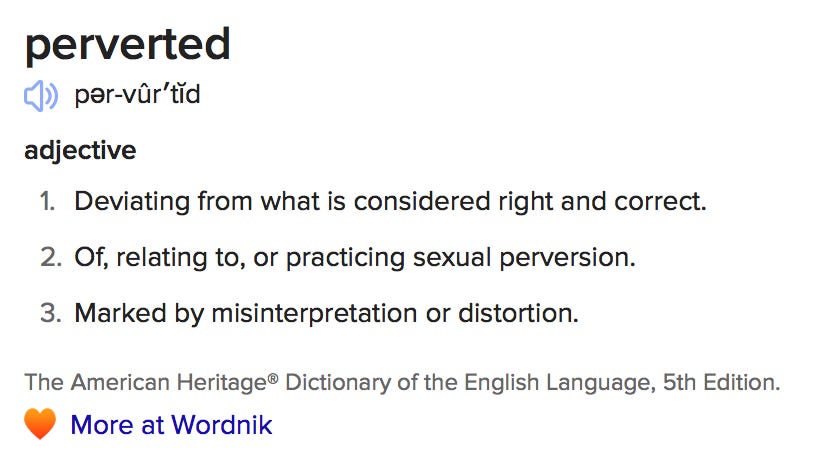Parenting Under the Rainbow Regime
childhood has been hijacked and parenthood has been villianized, but there are rainbows
Our best intentions have been perverted.
And by perverted, I mean “marked by misinterpretation or distortion.”
I think back to Orwell’s 1984 and realize that, by chipping away at language we can reconfigure understanding and literally change the meaning of words and ideas. I think this is what’s happening. Somewhere along the way, ideology replaced values and now everyone seems angry and confused, even as they attempt to be “good people.”
Diversity has become a direct route to groupthink.
New unspoken rules about empathy have made us fixate on hate.
Discussions about inclusion have led to “othering” and marginalization.
It’s as though a mind virus is spreading through all of our institutions. No wonder our children are struggling.
To be clear, taking issues with drag show hours for kids and books like Gender Queer in schools is not “anti-trans-activism" or hate any more than taking issue with pornography in schools and libraries is hate. People are afraid to speak up because opposing any of it is conflated with trans-phobia. But parental concerns have much more to do with what is appropriate for young children and who gets to decide.

Project Veritas gives us a glimpse of how some educators are approaching sex education here.

Why are so many of the people who claim to be for inclusion inclined to exclude parents from the conversation?

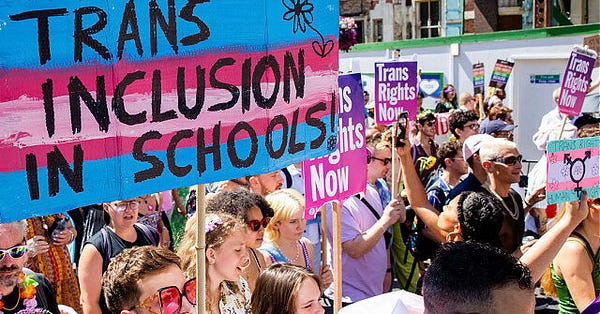
(Pedro Gonzalez has written a comprehensive paper about transgender politics here. Decide for yourself if this movement is rooted in altruism and the wellbeing of children.)
I’m grateful for legislators like Senator Mike Testa, who are calling out some of the lunacy that our tax dollars are sponsoring while our kids continue to fall behind academically.
Just when we thought the New Jersey Education Association (NJEA) could not possibly get any worse, they proved all of us wrong again at their most recent “convention” in Atlantic City last month. Instead of focusing on the things that matter to parents and their children, such as recouping grave learning losses due to draconian shutdowns of our schools, the NJEA felt it was worthwhile to host a drag queen story hour and invited irrelevant social justice warriors Nikole Hannah Jones and David Hogg to speak…
…According to the National Assessment of Educational Progress, the “nation’s report card,” math scores for fourth- and eighth-graders saw the largest decrease ever and reading scores dropped to levels not seen since 1992.
Much of what we’re seeing in debates about educational curriculums recently is less about academics and more about child rearing. And it seems based on the assumption that parents either don’t have it covered or they’re doing it wrong. Schools and other institutions are now taking it upon themselves to raise good citizens according to their own ideology… which is supposedly one of respect and empathy.
I’m wondering how parents somehow got cut out of the “respect” equation.
If the goal is to teach children to refrain from passing judgment on other human beings, these attempts fall short. Inserting your ideology into institutionalized learning and intervening with the raising of someone else’s child because you feel you are better equipped to understand their needs and teach them values is not only judgmental, it’s disrespectful.
And sometimes the message becomes parents don’t understand and they don’t need to know.

Sidelining Parents
The ideas often sound good initially. It Takes A Village promoted the idea that society shared in a the responsibility of raising a child. While there’s a seed of truth here - I do think a supportive community can enhance a childhood experience - the book paved the way for interference from neighbors, teachers, ministers, doctors, employers, politicians and society in some very personal parenting decisions.
Common Core, the educational initiative that was introduced in 2010, was when I started feeling institutionalized learning creating a wedge.
According to the Boston-based Pioneer Institute, which has closely studied Common Core, “Instead of accelerating the curriculum to more advanced topics and following the practices of leading international competitors, Common Core’s politically-driven process resulted in the adoption of the mediocre curriculum sequences used in a number of mid-performing states and promoted progressive instructional dogmas shared by its developers.”
https://www.pacificresearch.org/common-core-has-failed-americas-students/
It wasn’t test scores and performance that struck me. It was trying to help my kids do their math homework. The new math was like Babylon all over again. Kids and their parents seemed to speak a different language. I remember parents commiserating that their elementary school children were getting frustrated with parents who “didn’t get it”.
And who was behind this shift?
Bill Gates, a key godfather of the Common Core subject-matter standards, wrote five years ago that the national standards “will improve education for millions of students,” but a groundbreaking new study shows that Common Core has actually decreased the level of student achievement.
How many times does an out-of-touch billionaire have to be wrong before we stop letting him make gigantic decisions for the next generation?
Planting Toxic Seeds
Since then, the notion that parents don’t understand has been inserted everywhere. Just look up “without your parents” on WikiHow. There are dozens upon dozen of articles teaching kids how to circumvent parents. Or “how to deal” with parents. Separate articles walk kids through dealing with parents who are narcissistic, nosy, transphobic, mean, toxic, annoying, overprotective, strict christian, overly emotional, or emotionally distant, among other things.
Mature Minors and Abused Children
Changing definitions are having major impacts on parental rights. Many states have proposed legislation to remove parental consent for vaccinations, STD treatment, abortion and other medical procedures if they are considered mature minors.
At the same time, legislators are seeking to expand the definition of child abuse. According to NJ’s proposed bill A4500:
"Abused child" means a child under the age of 18 years whose parent, guardian, or other person having his custody and control:
Or a child whose physical, mental, or emotional condition has been impaired or is in imminent danger of becoming impaired as the result of the failure of his parent or guardian… to exercise a minimum degree of care (1) in supplying the child with adequate food, clothing, shelter, education, medical or surgical care though financially able to do so or though offered financial or other reasonable means to do so…(emphasis mine)
Again, we’re back at WHO DECIDES… what constitutes “adequate medical or surgical care”…or whether a young person is a mature minor?

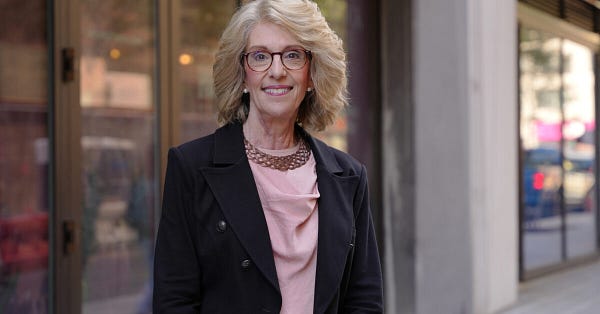
Apparently not parents.

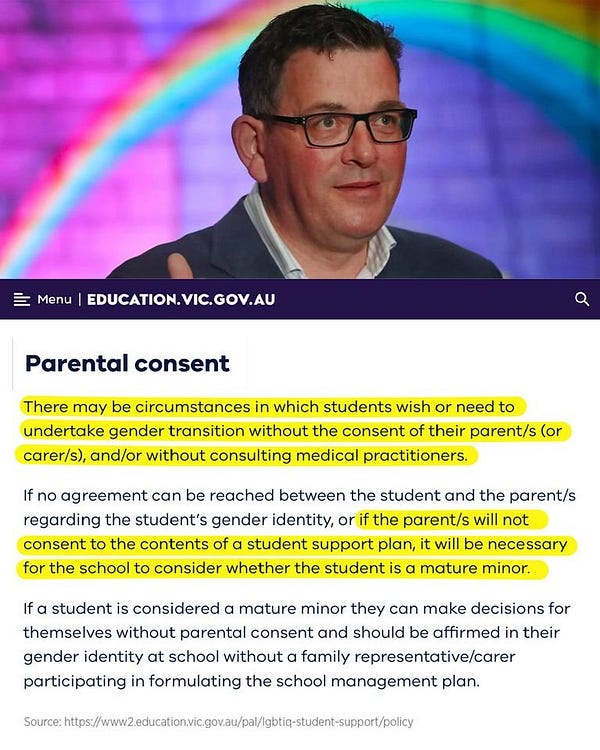

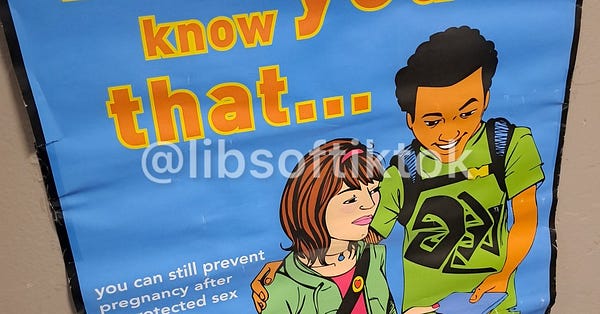

Are minors really mature enough to make such life-changing decisions without their parents even knowing? Science says no.
This 2013 paper highlights some concerns about letting young people make important, often irreversible medical decisions.
The mature minor exception in the healthcare law of the United States has served to enable those under the legal age to consent to medical treatment. Although originally developed primarily for minors in emergency or quasi-emergency need for health care, it was expanded especially from the 1970s in order to cover unemancipated minors older than 14 years. This expansion initially appeared plausible, given psychological data that showed the intellectual capacity of minors over 14 to recognize the causal connection between their choices and the consequences of their choices. However, subsequent psychological studies have shown that minors generally fail to have realistic affective and evaluative appreciations of the consequences of their decisions, because they tend to over-emphasize short-term benefits and underestimate long-term risks. Also, unlike most decisionmakers over 21, the decisions of minors are more often marked by the lack of adequate impulse control, all of which is reflected in the far higher involvement of adolescents in acts of violence, intentional injury, and serious automobile accidents.
In the case of most under the age of 21, subcortical systems fail adequately to be checked by the prefrontal systems that are involved in adult executive decisions. The neuroanatomical and psychological model developed by Casey, Jones, and Summerville offers an empirical insight into the qualitative differences in the neuroanatomical and neuropsychological bases of adolescent versus adult decision making. These and other data, as well as developing law bearing on the culpability of juvenile criminal offenders, argue for critically re-evaluating the expansion of the mature minor exception with regard to medical decision making..
This isn’t new. We’ve known this about adolescent brain development. You can read more about it here and here. It’s why the Joe Camel advertising campaign was considered so egregious.
Sadly, once parents are out of the way, there are some colorful characters who are eager to influence our kids.

Don't believe him?




I know, I know. This doesn’t represent everybody. Of course it doesn’t.
The vast majority of people just want kids to be open-minded and accepting of everyone… and a world where everyone is accepting of kids and their unique differences.
It’s also what parents want. And no one is more driven to create that world for their children… or to raise children who can create that world for themselves. So let parents parent.




